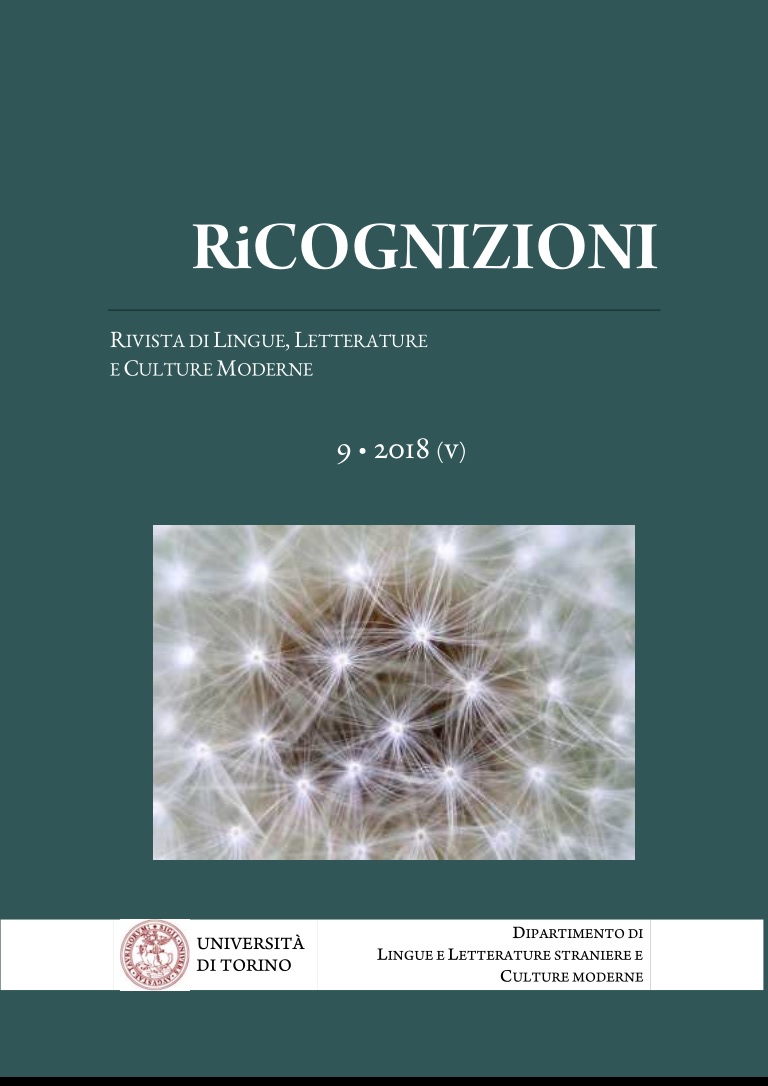L'ANELLO CHE MANCA. E QUELLO CHE NON TORNA IN "NATHANS TOD" DI GEORG TABORI
DOI:
https://doi.org/10.13135/2384-8987/2749Parole chiave:
Tabori, Lessing, parabola, parodia, teatro.Abstract
L’anello che manca. E quello che non torna in Nathans Tod di Georg Tabori propose a modern rereading of Lessing’s play Nathan the Wise (Nathan der Weise): Georg Tabori’s Nathans Death (Nathans Tod).
The paper aims for a comparative analysis of the famous ring parable. Asked by the Sultan to decide which of the three religions owns the truth, Nathan narrates the fable of a magic ring that has been passed from generation to generation and finally lost, when a father with three sons makes two copies of the original one. The ring symbolises the tyranny of a unique truth that has to be overcome, in order to achieve tolerance.
My interest focuses on two moments of Tabori’s rewriting of this fable.
On the one hand, I analyse the way in which Tabori glosses over the ring parable in the dialogue between Nathan and Saladin thanks to Horkheimer’s and Adorno’s Dialectic of Enlightement (Dialektik der Aufklärung) and to Arendt’s Man in Dark Times (Von der Menschlichkeit in finsteren Zeiten). In the economic and social paradigm of the modern Totalitarianism there is no more place for tolerance. On the other hand, I reflect on the new context in which Tabori places the ring fable narrated by Nathan just before his death in front of the bodies of his dead sons. I consider that choice to be a parody: The contrast between the original context of enunciation and the modern one is the way in which Lessing’s tolerance is finally checkmated.
Riferimenti bibliografici
Arendt, H. (1960), Von der Menschlichkeit in finsteren Zeiten. Rede über Lessing, Monaco, Piper Verlag.
Cases, C. (1963), Lessing: “Nathan il saggio”, in Saggi e note di letteratura tedesca, Torino, Einaudi: 66-81.
Fischer, B. (2000), Nathans Ende? Von Lessing bis Tabori. Zur deutsch-jüdischen Rezeption von „Nathan der Weise“, Gottinga, Wallstein Verlag.
Horkheimer, M., Adorno, Th. W. (1974), Dialettica dell’Illuminismo, trad. it. di Lionello Vinci, Torino, Einaudi.
Lessing, G. H., Nathan il saggio, in: Teatro, trad. it. di Barbara Allason, Torino, Unione tipografica.
Lessing, G. H.: Nathan der Weise, in: http://gutenberg.spiegel.de/buch/nathan-der-weise-1179/1.
Tabori, G., (2015), Nathans Tod nach Lessing, in: Theater, Gottinga, Steidl Verlag: 205-242.
##submission.downloads##
Pubblicato
Come citare
Fascicolo
Sezione
Licenza
Gli autori che pubblicano su questa rivista accettano le seguenti condizioni:- Gli autori mantengono i diritti sulla loro opera e cedono alla rivista il diritto di prima pubblicazione dell'opera, contemporaneamente licenziata sotto una Licenza Creative Commons - Attribuzione che permette ad altri di condividere l'opera indicando la paternità intellettuale e la prima pubblicazione su questa rivista.
- Gli autori possono aderire ad altri accordi di licenza non esclusiva per la distribuzione della versione dell'opera pubblicata (es. depositarla in un archivio istituzionale o pubblicarla in una monografia), a patto di indicare che la prima pubblicazione è avvenuta su questa rivista.
- Gli autori possono diffondere la loro opera online (es. in repository istituzionali o nel loro sito web) prima e durante il processo di submission, poiché può portare a scambi produttivi e aumentare le citazioni dell'opera pubblicata (Vedi The Effect of Open Access).








